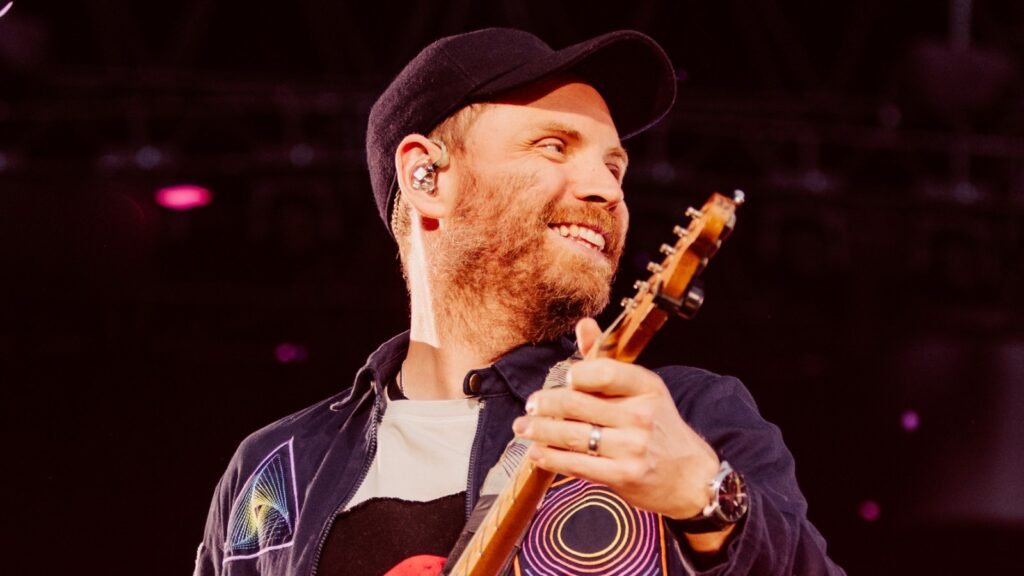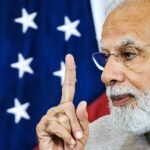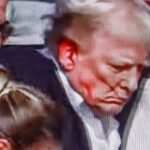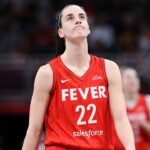Coldplay Guitarist Jonny Buckland on Band’s Future
It’s a few hours before showtime when Coldplay’s Jonny Buckland shows up in the makeshift “studio” in the warren of rooms beneath Accor Stadium. Later that night, the band will play their fourth and final Sydney show in their Music of the Spheres tour, which started in March of 2022 and has kept running even as Coldplay released another album, Moon Music. With tour dates set well into 2025, and no definitive end date in sight, makeshift studios like this one have allowed the band to continue to not just release music but to play around, experiment, and see what comes of it — as the four members have been doing since not long after they met in their first-year dorm at University College London some 28 years ago.
Today, black curtains line the walls, wires cross-cross the carpeted floor, and guitars rest on stands, near various monitors and a Roland keyboard. A Billboard Music award had been sitting on top of a crate until one of Coldplay’s co-managers whisked it away (“We’re a humble bunch,” she said, laughing. “A Billboard award here, a couple Grammys there.”)
“I don’t think these are our sofas,” Buckland explains, as he takes a seat on a tan leather one. “But the other stuff all comes with us. We have a studio guy who comes and builds this wherever we tour.” It’s sometimes said that Coldplay is a band of three introverts headed by one extreme extrovert, but Buckland says that’s not entirely true. “Next to Chris [Martin], we seem like introverts because he’s so extroverted,” the guitarist tells me. “But I think it would be very hard to do this and be a complete introvert.”
Still, as we talk over the course of more than an hour (for an interview conducted for Rolling Stone’s January cover story on the band), Buckland is soft-spoken and slightly bashful — certainly the least extroverted of the band’s members. He’s also affable and quick to smile under his gray, newsboy hat, as he discusses the high and low points of Coldplay’s career and his thoughts on the road ahead.
What was it like to write Moon Music while you were touring Music of the Spheres? I guess you’ve probably written a lot of music while touring.
Yeah, more now. Because we knew this tour was going to be long, we felt like, “Well, we need to keep creative and keep working.”
So what does that look like?
Normally it means we just come in here, we listen to music, we try ideas, do some overdubs and things. Certainly it’s easier in the earliest stages when you’re demoing. It’s quite tricky to record properly here because we don’t even have a drum kit. It’s just somewhere to come and listen to stuff and to keep going.
Just so you’re exercising that muscle.
Apart from Will and I, we all live in different places, so we try to use all the time we’ve got together as fruitfully as we can.
Do you have a number of songs that you know are going on the next album already or are things still percolating?
Well, I know there are some songs, some of which I’ve heard, some of which I haven’t. Chris [Martin] definitely is keeping some of them quite close to his chest.
So he’ll be like, “I have a song.”
Yeah, exactly. We’re like, “You can play it now. It’s all right.” He’s like, “It’s not ready.”
What a tease.
I know, I know. But also, sometimes it’s nice to hear it when you know you’re about to work on it as well, so it’s fresh.
Do you get Coldplay songs stuck in your head?
Not old ones, no. I don’t think so. It’d be annoying if that started happening now. But new ones, I do, as we’re working on them. You record them and then there’s a whole process of trying to work out how to do them live and learning them. And often when we go through the process of putting them together for the live concert, then that’s when it starts. You start just hearing them on a loop.
How do you know when a song is done?
Because we’ve released it.
Yeah, but you have some say in when that happens.
Yeah, I think it’s almost like you give up on changing it. Do you know what I mean? Well, it depends. Sometimes they’re just done. Sometimes it’s easy, and they’re just done. Other times you’ve changed them so much that you can lose sight of what they were in the first place. And then sometimes afterwards you’re like, “Was that the right way to do it?” But I’m quite good at letting them go once they’re done. I don’t worry too much.
One thing that I was talking about with [bassist] Guy [Berryman] was that he felt like since this tour started, something’s felt different. Do you agree?
Yeah, I do think it’s different. I think we feel quite confident about it in a way maybe we didn’t feel quite as sure before. I feel just more set in what we are trying to do.
And what do you think led to that? How do you get to a point where you feel that confidence?
It is hard to articulate. I think that it became clear that the tour wasn’t about us. And I think that is what we meant that we could let go of all the worries about, “Oh, is this cool,” or, “Am I going to look good doing this?” As soon as you let go of all that stuff, you’re like, “Oh, I don’t know what I was worried about.”
But how do you let go of all that stuff?
Because it’s not about us. Because it’s about the people coming.
But there’s always been people coming.
Of course, but I think as you’re coming up, it’s much more about, “Can we make it? Can we do it? Can we achieve this?” Of course, part of that is, “Can we achieve people having a nice time?” But really we turned it around to be that it’s only about can people have a nice time. If we do what we can do, then hopefully they will. It’s a slightly different attitude.
By many measures, Coldplay is the biggest band in the world. Is that what’s given you confidence?
Well, no, I don’t think we see it like that. But we took a long break from touring. When we did Everyday Life in 2019, we didn’t do any touring. We’d taken a year not doing very much as well before that. And then after that, then there was Covid, and we didn’t meet up very much. So we had a good five, six years where we didn’t tour at all. I think we were just ready to come back and do it.
And maybe it’s hard to have that perspective of it when you’re doing it all the time.
Yes, and you’re in a cycle of one after the other — you’re either touring or recording. We wanted to break that cycle.
Why didn’t you want to tour Everyday Life?
We never intended to. We wanted to make an album that we didn’t have to tour so we could make it sound different, if you see what I mean.
So you didn’t need something to fill an arena.
Yeah, it doesn’t have to sound big.
It could be more intimate.
Yeah. So we did that just before the pandemic, and then that was our pandemic album really. But we were lucky that in the gaps between things, we managed to get together a few times, enough to record anyway.
I want to go back to the beginning a little bit. I know that you and Chris met during college orientation. I know he heard you playing in your room. How far into the year was it?
A few months. I think by December, we’d maybe had a few practices, tried writing some songs together. He was like a whirlwind at the time, just, “Oh, you play the guitar? Brilliant. Let’s do something.”
And do you remember what you thought when he said that?
I thought, “Great.” That was literally why I’d come to university, to try and be in a band. So it was like, “Oh, yeah.” So we went to the bathroom down the end of the corridor, which had good acoustics — terrible acoustics in the room, horrible. This was a room with about four baths in it, and we played some stuff there. It was good.
Did you immediately think he was good?
I think it was more me thinking he was good.
But he approached you.
Well, true. I think maybe I was the only guitarist around or something. [laughs]
What did your parents think when you were like, “Hey, I’m at college, but I’m going to be in a band”?
I think they knew that I was more interested in music than astronomy or maths, although I do like those things.
I was going to say: Has your astronomy degree come in handy with the world building of Music of the Spheres?
[laughs] Occasionally I’m quite skeptical about the shape of some of these planets. I’m like, “I don’t think that’s possible.”
Were you nervous before the first show you played together?
Yeah, I used to be nervous for days before, literally days. It was awful. I think I would be awful as well. I’d be awful to be around, just really stressed and on edge.
And then when you got on stage, would that just go away?
It tended to, unless things started going wrong, and then it would come back. But yeah, as soon as you’re on stage, it’s fine.
You first started playing piano, is that right?
Yes, when I was really young I started it on the piano and, well, my brother played the guitar. My uncle played the guitar. So they were around, and I thought, “Oh, that looks quite cool. Maybe I can get my brother to teach me some stuff.” The first thing I learned was the chords to “Kinky Afro” by the Happy Mondays. There’s a particularly hard G minor in that one, a bar chord, and my fingers would be all sore.
Did you know you were good pretty early on? Were you getting good feedback?
[laughs] No, not really. I think I just thought I was good. No one else did. I think it was immediately like, “I’m going to do this,” but without any real evidence of that being a good idea necessarily.
But then somehow it was.
Yeah, yeah.
So you knew.
Or I got extremely lucky.
Both things can be true.
Yeah. I don’t know. I think that if you don’t want things to happen, then they probably won’t. I doubt I’m the only person who wanted that to happen, and I’m sure a lot of those people, it didn’t happen to, if you see what I mean. But if you don’t want it to happen, it’s definitely not going to.
Do your kids recognize that their dad’s a rock star? Do they think you’re cool?
I don’t think so. You’d have to ask them. I think that they love coming to the shows and stuff, but are they more likely to take my advice? I don’t think so.
The album that you’re working on now is going to be an animated musical?
Yeah, it’s interesting. We haven’t started working on it together yet, so we’re not quite sure how it’s going to pan out, but I think it’s going to be interesting. It’s going to be different.
When you work together now, how is it different from when you started out?
I think when we started out, we used to think that we had to spend every minute of every day together, and everybody had to be in [the studio] all the time doing everything. So after two weeks of that, we’d be completely burnt out, and you’d end up destroying things by working on them too long. We had a maximalist approach, which was: More, is more, must do as much as possible. When you think you have three or four weeks of studio time, and that’s all you’re going to have, you try and spend every second doing everything to get the most out of it.
Which makes sense.
It makes sense, but sometimes it has the opposite effect. You end up pulling things apart that were quite good because you’re just a bit tired. Now we do less, but do more; less time, more stuff, faster. So it’s just a bit more focused, and I think we’re a bit more aware of how long [to work] before you start ruining things by going over and over them.
What do you do to stay mentally and physically healthy on tour?
I think it’s just going for walks in the day and stuff, just trying to get outside and see something that isn’t a curtained room without a window, because there’s quite a lot of sitting in rooms like this on tour. So it’s just good to get outside and see something nice.
The Grammy Awards are coming up. What are you cheering on right now?
I thought it was quite nice that the Beatles got the nomination. I thought that was quite sweet. I suppose I only read the big numbers like Sabrina Carpenter and Beyoncé, so lots of great records. I suppose the most outlier one was the Beatles, because obviously it’s such a strange recording process for that song.
When you’re home, what’s an average day like?
We live in these sections: tour, not tour. [At home] I tend to hunker down, do pretty normal stuff, like taking my dog for a walk and hanging out with my kids when they want to hang out with me occasionally — they’re 17 and 13. I go pick them up so I can force them to talk to me in the car.
Looking back, what would you say is the highest point and lowest point of the band’s quarter-century career?
Highest is tricky. There’s been some wonderful moments, but I wouldn’t say one was particularly higher than another. Lowest is easier; I would say our American tour for X&Y, [when we were] on a tour bus for 12 weeks. We were quite miserable, confused.
The band almost broke up then.
Well, I don’t know whether it would ever have come to that, but it definitely did not feel like a happy place. After that we changed a lot of stuff, so it was good. But we also didn’t have Phil [Harvey] then, which didn’t help. He is the fifth member, our creative director. He is involved in everything. He’s a sounding board for every idea, every song, everything. And he’s just a nice person to have around, especially for Chris, I think.
What’s a high point?
A high point was the first time we headlined Glastonbury in 2002, which felt pretty extraordinary — but every time we’ve been back has also felt pretty extraordinary. I feel like when we’ve done big moment concerts, that’s when I feel the most connected to it. And this tour is probably a high point. You know what? Playing “Everyday Life” in Jordan on top of the hillside. That was weird and wonderful to do, and I felt like that’s just an extraordinary place to play music. Also, it was freezing cold, and the album made sense doing it like that somehow.
Do you have a favorite part of the show?
I think it’s hard not to like the moment when we start “Sky Full of Stars” because the anticipation and build-up is wonderful.
So what do you do now? What’s your pre-show routine?
I’m going to meditate for about 20 minutes, eat some dinner.
I’ve been hanging out with your crew, with you, with Guy, and everyone seems very calm. Is that just temperament or is it something you’ve worked on, something you’ve really cultivated?
I think I’ve always been quite temperamentally calm. But yeah, I think generally as a band we’ve gotten calmer. We weren’t always a calm band necessarily, but I think dealing with the fallout from that low point, starting to talk to each other a bit more, trying to be a bit more understanding of what people wanted and where they were in their lives and what was going on. That’s an ongoing process.
When you got back from that tour, did y’all just not talk for a while?
You know what? We got back and we got our own studio, the Bakery. We got a home.
So you actually doubled down.
Yeah, and it was great. It was suddenly like, “Oh, we’ve got a home. We’ve got a place where we can put all our stuff. We can just come anytime and play.” And we rediscovered a love of music and experimentation. I think with that third album we just didn’t quite know what we wanted to do and felt that we were on tracks, that we had to go down a certain path. And getting that place meant we could get rid of those tracks and try some different things, and start enjoying it again.
I’m always interested in these points in people’s lives where something shifts. Do you remember your parents coming to watch early shows and how they responded to the momentum that was sweeping you guys along?
Yeah, they were pretty excited, I think. They were very supportive. They didn’t display any stress about it all — to me anyway — whether they felt it or not. But yeah, I remember them going to an early concert we did in Chester in 1999 — tiny, probably they were the only people there. Well, maybe them and three others.
Was it weird that they were there?
No, it was great. I loved it. It was nice because that was the first time they’d seen us, I think. They were very supportive, as parents have to be sometimes.
When you’re playing an older song, are you thinking back to that moment when it first came into your lives? Or is it more being in this moment?
It’s much more being in this moment, much more. With “Sparks” in particular, it felt like quite a special recording session for some reason. We were recording it in a room not much bigger than this, and we recorded it live and it was just a really lovely moment. So with that song, sometimes I do think about that — trying to play the guitar and the piano and trying not to hit the piano with the guitar while we’re recording.
“Retirement” is probably the wrong word, but how do you feel about this idea that there is an end in sight — at least of Coldplay’s discography?
A couple of albums ago, Chris just said, “We’re going to do 12 albums.” I remember thinking, “God, that’s so far off. I can’t even think about it. I don’t know how you can think three albums ahead. It could be another 10 years.” So I didn’t worry about it, and I haven’t worried about it. I suppose everything has to end at some point. Why not choose?
But when you think about it, what emotions come up?
I don’t know. I feel like I’m not going to feel those things until it’s done, honestly. I think then I’ll have to come to terms with it, but until that point, I feel like the hill is quite big in front of us. I can’t see the land beyond.
So you don’t know if it’ll be relief or despair?
Yeah, or tragedy or misery. I don’t know. And I don’t really want to imagine. I’m happy to experience it at the time. And I don’t know how long these next two albums will take. People suggest timelines that we almost never stick to.
I do love Chris’ idea of ending on something very intimate though, kind of coming full circle a bit.
Yeah, me too. But you can have ideas about things, and until you actually do them, you don’t really know what is going to happen. Some events can overtake you.
You may be interested

Texans add Pro Bowl wide receiver Diontae Johnson after devastating injury to Tank Dell
new admin - Dec 24, 2024[ad_1] The Houston Texans claimed wide receiver Diontae Johnson off waivers from the Baltimore Ravens on Monday after Tank Dell…

Legendary cartel drug lord Fabio Ochoa Vasquez deported to Colombia after release from U.S. prison
new admin - Dec 24, 2024One of Colombia's legendary drug lords and a key operator of the Medellin cartel has been deported back to the South American…

The FTC orders Marriott and Starwood to beef up their data security
new admin - Dec 24, 2024The Federal Trade Commission announced on Friday it finalized an order (pdf) requiring Marriott International and subsidiary Starwood Hotels to…




































